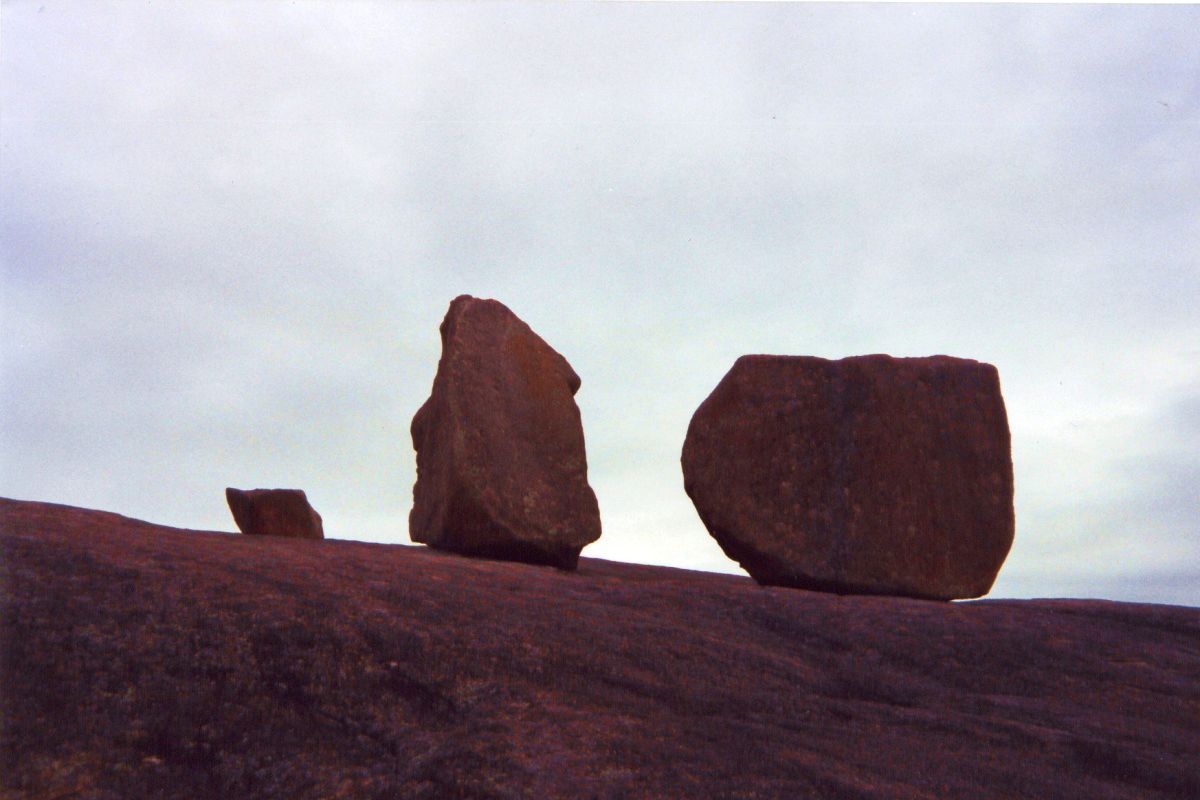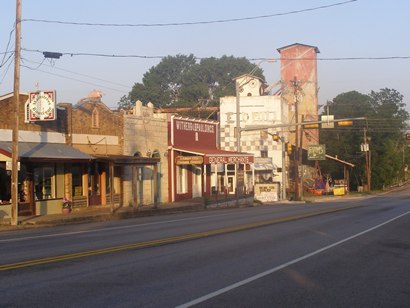Blue Highways: Fredericksburg, Texas
Unfolding the Map
Click on Thumbnail for MapSprechen Sie Deutsch? Möchten Sie in Fredericksburg zu stoppen und ein Bier trinken, erfahren Sie Chester Nimitz, und machen einen Abstecher zum Enchanted Rock? Klicken Sie auf die Miniaturansicht der Karte zu sehen, wo diese den meisten deutschen Städten von Texas befindet, und Prosit!
Book Quote
"People who think the past lives on in Sturbridge Village or Mystic Seaport haven't seen Fredericksburg. Things live on here in the only way the past ever lives -- by not dying. It wasn't a town brought back from the edge of history; rather, it was just slow getting there. And most of the old ways were still comparatively unselfconscious."
Blue Highways: Part 4, Chapter 6
 Downtown Fredericksburg, Texas. Photo by Frank Thompson at virtualtourist.com. Click on photo to go to site.
Downtown Fredericksburg, Texas. Photo by Frank Thompson at virtualtourist.com. Click on photo to go to site.
Fredericksburg, Texas
Fredericksburg is a strange place. I don't mean that in a negative way. It is strange as in the good strange. I never knew much about the town, other than its German roots, before I visited there. Nestled in the Texas Hill Country, it is seems to defy what you'd think a Texas town would be.
First of all, as LHM chronicles in the chapter from which I took the quote, this town in about as landlocked a place that you could ever think was the home town one of the bigger than life leaders that won World War II, Chester Nimitz. That might not seem too off kilter, because we expect Texas to give us bigger than life military heroes. But an admiral? And not just an admiral, but the admiral in charge of the entire Pacific theater during World War II. And not only that, but a man of German descent who helped defeat the Axis Powers - we should remember that when we question immigrants' fidelity to their new country.
LHM writes that Nimitz' grandfather built a hotel in Fredericksburg, and the shape of the hotel suggested a steamboat. He speculates that the young Chester Nimitz might have gotten his attraction to his maritime career by seeing that hotel "sail" across the Texas landscape. Nimitz, like a lot of bigger than life heroes, was a straight-ahead military commander. He was the exact counterpoint to General Douglas MacArthur, the other larger than life commander in the Pacific Theater, whose military style was based on deception and counterthrust. Nimitz's straight ahead style got him in trouble in his early career when he ran his first command, a destroyer, aground on a reef. The resulting court martial did not derail him, however, and his efforts and the efforts of the men of all services that he put into battle turned the tide against the Japanese and won the war. Today, his deeds are celebrated in history, on film, and in the National Museum of the Pacific War in his home town of Fredericksburg.
That's just one little example. A second example is Fredericksburg's overwhelming German feel. When I lived in San Antonio, a neighbor and colleague in my Master's program was German - I mean speaks fluent German German. I was surprised to learn that his father, an officer in the German Air Force, was stationed in El Paso and retired to Fredericksburg. Why would the German Air Force have an officer in El Paso, I wondered? A liaison? It turned out that the German Air Force had planes and men stationed in El Paso because they used the air base there for training. When my friend's father retired from his military service, they settled in Fredericksburg. And after visiting there, I understood why. The town is SO German that English is almost, but not quite, a second language. Townspeople gather at public places and play skat, a German card game. The town has a distinct German feel and taste. The only thing was at the time it didn't have a brewery, which surprised me, though you can get good beer in Fredericksburg.
Of course, the Fredericksburg that LHM describes, the unselfconscious town, has been somewhat replaced by tourist-grabbing stores. Fredericksburg now knows it's a tourist destination as that German city in the middle of Texas. But in some ways, because many of the residents are first or second generation Germans and its comparative isolation, it still retains that sense of authenticity that you don't find in other similar places nearer large population centers.
Some of our best moments near Fredericksburg came at Enchanted Rock State Park. Enchanted Rock is sort of like Texas' mini-Ayres Rock. It is a large buried boulder sticking out of the ground a few minutes north of Fredericksburg. A short climb brings you to the top, where you can view out over the surrounding Texas landscape.
 I walk down a side of Enchanted Rock while my dog Hannibal watches. Photo by Megan Kamerick.The natives in the region considered it sacred, and one can almost feel the eons of history that the rock, unmoving, has experienced. Sit on top of the unchanging rock, with the breeze whistling through your hair and past your ears, and you can be at any point in time you choose.
I walk down a side of Enchanted Rock while my dog Hannibal watches. Photo by Megan Kamerick.The natives in the region considered it sacred, and one can almost feel the eons of history that the rock, unmoving, has experienced. Sit on top of the unchanging rock, with the breeze whistling through your hair and past your ears, and you can be at any point in time you choose.
 Boulder sentinels stand guard atop Enchanted Rock. Photo by Michael L. HessOn the rock, the cosmos whirl about you, until with cleansed heart you travel back to Fredericksburg for a bratwurst and kraut, a good beer, and the sound of German in the middle of America.
Boulder sentinels stand guard atop Enchanted Rock. Photo by Michael L. HessOn the rock, the cosmos whirl about you, until with cleansed heart you travel back to Fredericksburg for a bratwurst and kraut, a good beer, and the sound of German in the middle of America.
Musical interlude
For a Texas musical interlude, we have Austin singer-songwriter Sara Hickman, another of my favorites. Sara was named the 2010-2011 State Musician of Texas. She is a fun songwriter, and very committed to children and moms. I've never seen her live, unfortunately. This is a little throwaway ditty called "Are We Ever Gonna Have Sex Again" that she did on a local television show, but you can see her humor in her lyrics and her style. When I first heard her I got a crush on her...and this song does not help that at all.
If you want to know more about Fredericksburg
Fredericksburg Chamber of Commerce
Fredericksburg Convention and Visitors Bureau
Fredericksburg History
Fredericksburg Online
Fredericksburg Standard (newspaper)
Oktoberfest Fredericksburg
Wikipedia: Enchanted Rock
Wikipedia: Fredericksburg
Next up: Mason, Texas




 Tuesday, February 8, 2011 at 9:39PM
Tuesday, February 8, 2011 at 9:39PM

